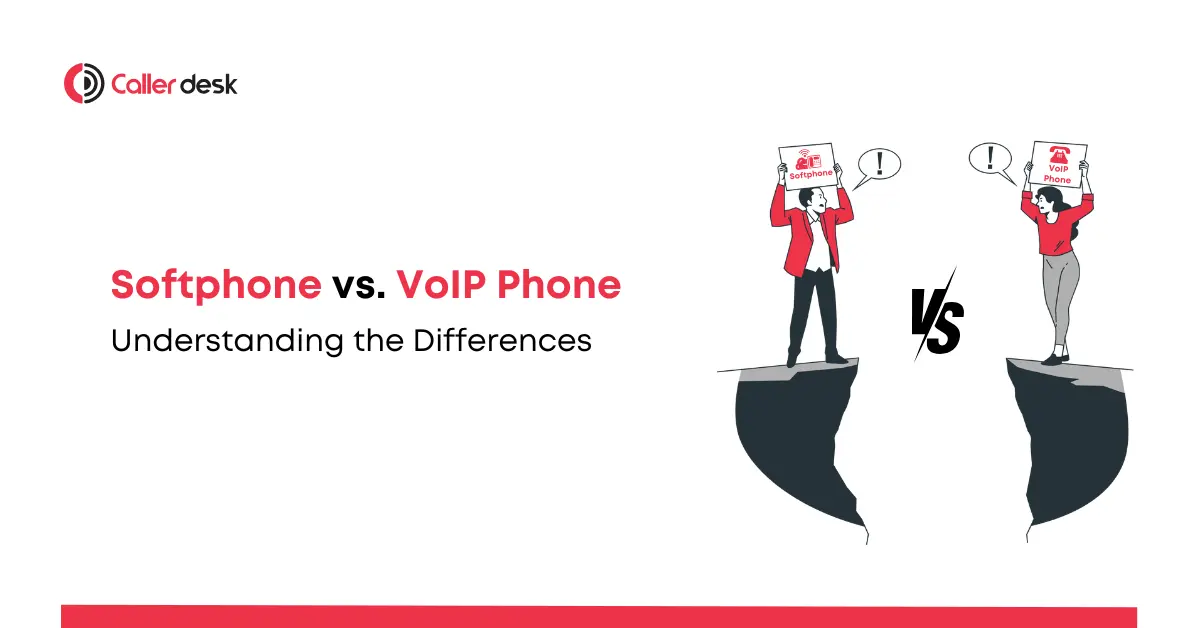Communication is at the heart of every successful business. Whether you’re coordinating with remote teams, handling customer inquiries, or closing sales, having a reliable and efficient communication system is non-negotiable. Businesses are moving away from traditional phone systems and embracing advanced internet-based solutions. Two of the most prominent options are softphones and VoIP (Voice over Internet Protocol) phones.
Both solutions leverage VoIP technology to facilitate calls over the internet, but their applications and advantages differ significantly. Deciding between softphones and VoIP phones requires an in-depth understanding of how they work and what they offer. This guide will help you explore their unique benefits, use cases, and the factors you should consider to make the right choice for your business.
What Is a Softphone?
A softphone is a software-based phone system that operates through the internet. Instead of relying on physical hardware, softphones are installed on devices like laptops, desktops, smartphones, or tablets. These applications allow users to make and receive calls, send messages, and even hold video conferences from virtually anywhere with an internet connection.
Softphones are popular among businesses with distributed teams or those that require mobility. They are feature-rich, affordable, and highly scalable, making them a preferred choice for startups, remote teams, and small-to-medium enterprises.
Key Features of Softphones
- VoIP Calling: High-quality voice calls over the internet.
- Video Conferencing: Seamless virtual meetings with clients or team members.
- Instant Messaging: Real-time text communication to speed up workflows.
- CRM Integration: Sync with business tools to access customer data during calls.
- Scalability: Add new users or features without physical infrastructure.
What Is a VoIP Phone?
A VoIP phone is a physical device designed to make internet-based calls, functioning as a modern alternative to traditional desk phones. These phones resemble standard landline devices but connect through Ethernet cables rather than copper wiring.
VoIP phones are often used in businesses with fixed office setups or those transitioning from traditional PBX systems to internet-based solutions. They provide excellent call quality and reliability, making them ideal for businesses prioritizing consistency and professional setups.
Key Features of VoIP Phones
- Ethernet Connection: Provides stable call quality through wired networks.
- PBX Integration: Works seamlessly with private branch exchange systems.
- User-Friendly Interface: Offers familiarity for employees accustomed to traditional desk phones.
- Durability: Designed for high-usage environments like call centers or corporate offices.
Softphone vs. VoIP Phone: A Comprehensive Comparison
Let’s break down the key differences between softphones and VoIP phones to help you understand which one aligns best with your business needs:
1. Flexibility and Mobility
- Softphone: Perfect for businesses embracing remote or hybrid work models. Softphones allow employees to stay connected from anywhere, making them ideal for dynamic teams or traveling professionals.
- VoIP Phone: Primarily used in fixed office setups, offering limited mobility. Ideal for centralized operations like call centers or traditional offices.
2. Cost and Budgeting
- Softphone: Cost-effective, with minimal setup fees. You only need a subscription plan and an internet-enabled device, making it a budget-friendly option for startups and small businesses.
- VoIP Phone: Requires an upfront investment in hardware, installation, and maintenance. While the long-term operational costs may be reasonable, the initial expenditure can be significant.
3. Call Quality and Reliability
- Softphone: Call quality is highly dependent on the device and network strength. Businesses must ensure stable internet connections to maintain consistent communication.
- VoIP Phone: Wired Ethernet connections ensure superior and stable call quality, minimizing dropped calls and audio disruptions.
4. Features and Functionality
- Softphone: Offers advanced features like video calls, messaging, call forwarding, and integration with CRM tools. These additional functionalities make softphones more versatile.
- VoIP Phone: While reliable for voice communication, VoIP phones lack the modern features and cloud-based integrations of softphones.
5. Scalability and Growth
- Softphone: Highly scalable, allowing businesses to add or remove users through a user-friendly dashboard without the need for hardware changes.
- VoIP Phone: Scaling requires purchasing additional devices and setting them up, which can be time-consuming and costly.
Which Solution Is Right for Your Business?
When choosing between softphones and VoIP phones, the decision depends on your business model, team structure, and operational goals.
Choose Softphones If:
- Your team is remote, hybrid, or distributed across multiple locations.
- You need advanced features like video conferencing, CRM integration, or real-time messaging.
- Scalability and cost efficiency are your top priorities.
- You prefer flexibility to work from any internet-enabled device.
Choose VoIP Phones If:
- Your business operates from a fixed office setup with centralized operations.
- You require high call reliability with minimal dependence on network fluctuations.
- A professional and traditional desk phone setup aligns with your brand image.
- You don’t require additional features beyond voice communication.
Why CallerDesk Offers the Best Communication Solutions
Whether you prefer softphones, VoIP phones, or a combination of both, CallerDesk offers tailored solutions to meet your business’s unique needs.
CallerDesk’s Unique Features:
- Unified Platform: Integrates voice, video, messaging, and CRM tools for seamless communication.
- Custom Scalability: Easily adjust user licenses and features as your business grows.
- Advanced Call Analytics: Track call performance and optimize workflows with actionable insights.
- Robust Security: End-to-end encryption and compliance with global standards like GDPR and HIPAA.
- Dedicated Support: 24/7 technical assistance to ensure uninterrupted operations.
Conclusion
Selecting the right communication system is not a one-size-fits-all decision. Softphones excel in flexibility, cost efficiency, and modern features, making them ideal for dynamic, tech-forward businesses. VoIP phones, on the other hand, provide stability and reliability, suiting businesses with established office setups and centralized teams.
CallerDesk bridges the gap between these technologies, offering customized solutions to help businesses thrive. By choosing the right tools and leveraging CallerDesk’s innovative features, you can ensure seamless communication, boost productivity, and stay ahead in today’s competitive landscape.
Contact CallerDesk today and schedule a free demo to find the perfect communication solution for your business!
Frequently Asked Questions
1. What is the primary difference between a softphone and a VoIP phone?
A softphone is a software-based solution that operates on devices like computers and smartphones, allowing calls over the internet. A VoIP phone is a physical device that uses VoIP technology to make calls, resembling a traditional desk phone but with internet-based functionality.
2. Are softphones better for remote work?
Yes, softphones are ideal for remote or hybrid work setups. They provide flexibility by allowing users to make calls, join meetings, and collaborate from any internet-enabled device, ensuring seamless communication from anywhere.
3. Do VoIP phones offer better call quality than softphones?
VoIP phones typically provide more stable and higher call quality since they are often connected via Ethernet, reducing dependency on Wi-Fi or mobile data strength. Softphone call quality depends heavily on the network and device used.
4. Can I use both softphones and VoIP phones in my business?
Absolutely! Many businesses use a combination of both to cater to different team needs. For example, softphones for remote employees and VoIP phones for office-based teams.
5. What are the cost differences between softphones and VoIP phones?
Softphones are generally more cost-effective, with lower upfront costs since they don’t require hardware. VoIP phones involve higher initial investments due to the need for physical devices but may offer long-term reliability for office setups.
6. Which option is more scalable for growing businesses?
Softphones are more scalable, as you can add users or features easily through a digital interface without purchasing additional hardware. VoIP phones can scale as well but require more physical setup and investment.
7. How secure are softphones compared to VoIP phones?
Both can be highly secure if equipped with proper measures like encryption, multi-factor authentication, and compliance with security standards. Softphones may require additional safeguards for public network usage.
8. Are VoIP phones outdated with the rise of softphones?
Not at all. VoIP phones remain relevant for businesses that prioritize stability, professional desk setups, and office-based operations. Softphones are complementary rather than replacements in many cases.
9. Can CallerDesk support both softphones and VoIP phones?
Yes, CallerDesk offers tailored solutions to support both softphone and VoIP phone systems, ensuring seamless integration, robust security, and advanced communication features.
10. What factors should I consider when choosing between the two?
Evaluate your business’s mobility needs, budget, desired features, scalability, and team preferences. For flexibility and cost savings, opt for softphones. For reliability and a professional setup, VoIP phones are a better fit.





